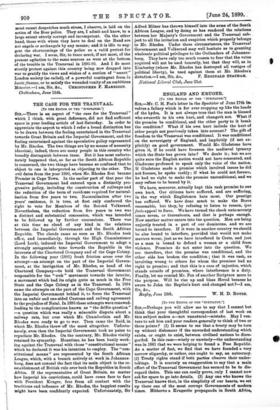ENGLAND AND KRUGER.
[To THE EDITOR OF THE "SPECTATOR."] SIR,—Mr. C. H. Fox's letter in the Spectator of June 17th in- volves a fallacy which is for ever cropping up like the heads
of the hydra. It is not always true that the man is blessed who sweareth to his own hurt, and changeth not. What if the promise be conditional, and the other party to it break the condition ? What if his own hurt include the hurt of other people not previously taken into account? The gift of freedom to the Transvaal was conditional. It was conditional on the sovereignty of England, and implicitly (if not ex- plicitly) on good government. Would Mr. Gladstone have given it, if he could have foreseen the mediaeval tyranny which the State has grown into ? We doubt it ; but we are quite sure the English nation would not have consented, and Gladstone professed to speak only the voice of the nation.
If Gladstone made a promise which involved issues he did not foresee, he spoke rashly ; if what he could not foresee, he had no right to make the promise unconditional, and we may refuse to be bound by it.
We have, moreover, actually kept this rash promise to our own hurt. Our citizens have suffered, and are suffering, in the way which Englishmen hate most. Our prestige
has suffered. We have done much to make the Boers reasonable, but they, by refusing to listen to reason, ipso facto appeal to force. We have turned the cheek unto seventy
times seven, or thereabouts, and that is perhaps enough. Now another matter enters into the question. Men are being unjustly treated in a part of our dominions, and we are bound to interfere. If it were in another country we should be also bound to interfere, provided that would not make matters worse, just as we have interfered in Crete, and just as a man is bound to defend a woman or a child from violence. Promises do not enter into the question. We see, therefore, that the promise was conditional, and the other side has broken the condition ; that it was rash, as involving wrong to others for whom the promiser had no right to promise; and that this is a case of injustice, which stands outside of promises, where interference is a duty. Finally, let me remind Mr. Fox of another Scripture more to the purpose. Will he rise up and bless Herod because he swore to John the Baptist's hurt and changed not P—I am, Sir, &c.,


















































 Previous page
Previous page